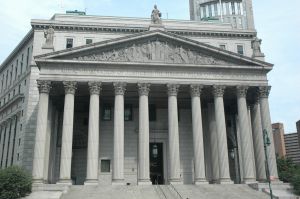 The estate laws in New York are comprised of a variety of statutes which set forth the right of individuals regarding estate inheritance. Some of these more well-known rules relate to a decedent’s surviving spouse. For example, as estate lawyers are aware, a surviving spouse cannot be completely disinherited. Estates, Powers & Trusts Law Section 5-1.1A entitled “Right of election by surviving spouse” mandates that a spouse is entitled to receive essentially one-third (1/3) of a decedent’s net estate. An interesting aspect of the statute is that it includes assets referred to as testamentary substitutes in the calculation. Such assets are in the form of joint ownership or pay on death items which are outside of the probate or intestate administration estate.
The estate laws in New York are comprised of a variety of statutes which set forth the right of individuals regarding estate inheritance. Some of these more well-known rules relate to a decedent’s surviving spouse. For example, as estate lawyers are aware, a surviving spouse cannot be completely disinherited. Estates, Powers & Trusts Law Section 5-1.1A entitled “Right of election by surviving spouse” mandates that a spouse is entitled to receive essentially one-third (1/3) of a decedent’s net estate. An interesting aspect of the statute is that it includes assets referred to as testamentary substitutes in the calculation. Such assets are in the form of joint ownership or pay on death items which are outside of the probate or intestate administration estate.
While a spouse cannot be disinherited, another estate statute allows a spouse to be disqualified entirely from receiving any estate interest. EPTL Section 5-1.2 entitled “Disqualification as surviving spouse” mandates that a spouse can lose inheritance if, among other provisions, the surviving spouse abandoned the decedent. It should be recognized that abandonment is not easily proved and that a mere consensual separation of spouses, even if for many years, typically would not result in a disqualification. The New York Probate Lawyer Blog has posted numerous articles regarding spousal rights and estate inheritance. Executors and Administrators should be aware of these provisions.
A spouse is not the only family member who may lose rights through disqualification. EPTL Section 4-1.4 entitled “Disqualification of parent to take intestate share” provides details as to the loss of a parent’s portion of an estate. It should be remembered that under the laws of intestacy provided by EPTL 4-1.1 (“Descent and distribution of a decedent’s estate”), a parent inherits an estate where there is no surviving spouse or children or their descendants. The statute states that if a parent does not provide for a child, i.e., support the child, or abandons the child while the child is under age 21, then the parent forfeits the inheritance. The statute is focused on the intentional actions of a parent rather than a parent where, through no fault, cannot provide support.
 There are numerous occasions where the Surrogate’s Court appoints a fiduciary to oversee an estate or a trust. With regard to an estate, the Court may need to appoint an executor or a preliminary executor in the case of a probate proceeding. If a decedent dies intestate, it may be necessary to appoint an administrator or temporary administrator.
There are numerous occasions where the Surrogate’s Court appoints a fiduciary to oversee an estate or a trust. With regard to an estate, the Court may need to appoint an executor or a preliminary executor in the case of a probate proceeding. If a decedent dies intestate, it may be necessary to appoint an administrator or temporary administrator. New York Probate Lawyer Blog
New York Probate Lawyer Blog










